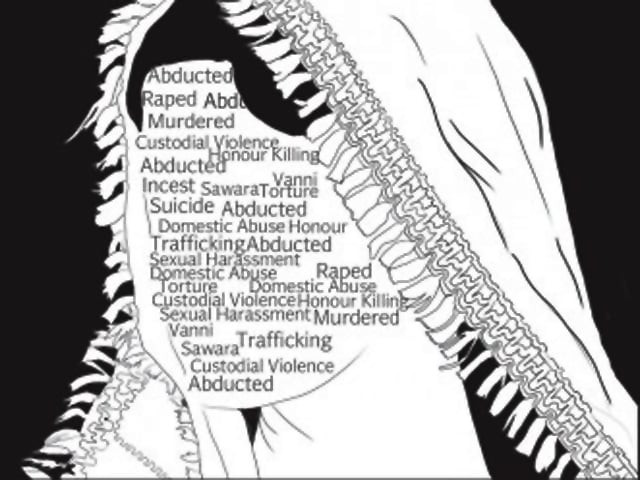International Women’s Day: Who will listen to her Story?
1 year after Domestic Violence Act 2013 passed, actual situation of women suffering from violence has hardly changed.

In cases registered under the Act, the perpetrator who can be either a man or a woman within the domestic household can land up for two years in prison. PHOTO: FILE
If Sana Fatima’s case of being beaten up and abuse by her drunkard husband when she would ask for household expenses was handled by a well-informed police officer, her husband would have served some months in jail or be forced to pay compensation. He, possibly, would have been a different man today.
But one year after The Domestic Violence (Prevention and Protection) Act 2013 was passed by the Sindh Assembly on March 8, 2013 marked as International Women’s Day, the actual situation for women suffering from violence at home has hardly changed.
Not a single case under this Act has been registered so far, say police officers and lawyers, citing lack of awareness among authorities and societal attitudes as the main reasons for the failure.
In cases registered under the Act, the perpetrator who can be either a man or a woman within the domestic household can land up for two years in prison.
Fatima who had come to complain about her abusive husband to the South Zone’s Women Police Station was told to file an application to the court, since the SHO there had no clue that such a case could be exclusively filed.
“Only last night he hit me with a hanger,” said Fatima, pulling up the left sleeve of her burqa to show the mark. “He comes home drunk and starts to beat me. I can’t tolerate this,” pleaded the woman to the police. The SHO, who listened attentively to her, told the staff to call up the husband who is a mechanic, to come to the station in the evening. Instead of registering an FIR, the officer would counsel the husband to leave his violent ways.
Sindh is the first province to get its own domestic violence law. Lawyer Maliha Zia Lari, who helped frame the domestic violence bill, terms it unfortunate that there is no awareness among the majority of the police officers or lawyers about this bill.
“Though the bill was passed, the government did not focus on to how to disseminate information and awareness properly. There has been no implementation on that.”
Currently, for victims of violence coming to the police station, cases under different sections of the Pakistan Penal Code (PPC) are registered. Women like Sana are told to go to court or sent home or convinced by the police to reconcile.
Lari explained that the commission and committees pertaining to domestic violence victims that were to be formed under the Act to strengthen it are yet to be created. “The rules of business regarding the commission and committee are being drafted by the government now,” she said, adding that in the past, several cases of domestic violence have been filed under honour killing incidents.
On the other hand, police officers believe that in addition to the police being aware, a lot depends on the victims. Senior police officer Javed Odho said, “It is easy to bring these laws but difficult to change attitudes. Woman who would go to complain against their men in the police stations would be considered very negatively. Though laws are made, people do not accept them as they defy societal norms.”
The Domestic Violence (Prevention and Protection) Act 2013
Under the 12-page Act, Section 5 offers a comprehensive definition of domestic violence which is not only limited to physical or psychological abuse against women, children or vulnerable persons, but also assault and criminal intimidation. Under emotional, psychological and verbal abuse are included insults or ridicule, threats to cause physical pain, blaming a spouse of immorality and threats of divorce. Domestic violence also means harassment, stalking, hurt, false allegations over the character of a women, sexual abuse, economic abuse and wrongful confinement.
The Act states that the government is to ensure that concerned officials are given awareness training regarding the law.
Section 6 of the Act defines punishment, some of which is awarded under the PPC. Under emotional, psychological and verbal abuse, a person is liable to six months imprisonment and fine of Rs10,000. A violator involved in sexual abuse of the woman or husband involved in making her cohabit with others can be in prison for two years.
Published in The Express Tribune, March 8th, 2014.



















COMMENTS
Comments are moderated and generally will be posted if they are on-topic and not abusive.
For more information, please see our Comments FAQ